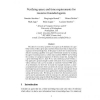830 search results - page 112 / 166 » Topological Reasoning and The Logic of Knowledge |
ATAL
2006
Springer
13 years 11 months ago
2006
Springer
The effective reasoning capability of an agent can be defined as its capability to infer, within a given space and time bound, facts that are logical consequences of its knowledge...
KR
2010
Springer
14 years 13 days ago
2010
Springer
This is a case-study in knowledge representation. We analyze the ‘one hundred prisoners and a lightbulb’ puzzle. In this puzzle it is relevant what the agents (prisoners) know...
EGICE
2006
13 years 11 months ago
2006
System identification is an abductive task which is affected by several kinds of modeling assumptions and measurement errors. Therefore, instead of optimizing values of parameters ...
ECSQARU
2007
Springer
14 years 1 months ago
2007
Springer
Measuring inconsistency in knowledge bases has been recognized as an important problem in many research areas. Most of approaches proposed for measuring inconsistency are based on ...
RSCTC
2000
Springer
13 years 11 months ago
2000
Springer
This paper introduces a neural network architecture based on rough sets and rough membership functions. The neurons of such networks instantiate approximate reasoning in assessing ...

